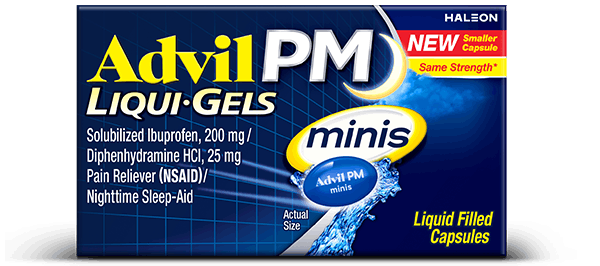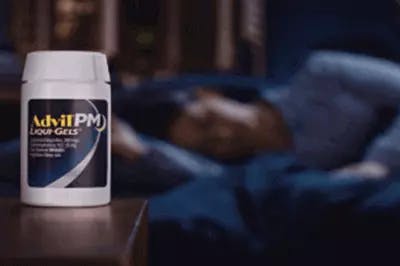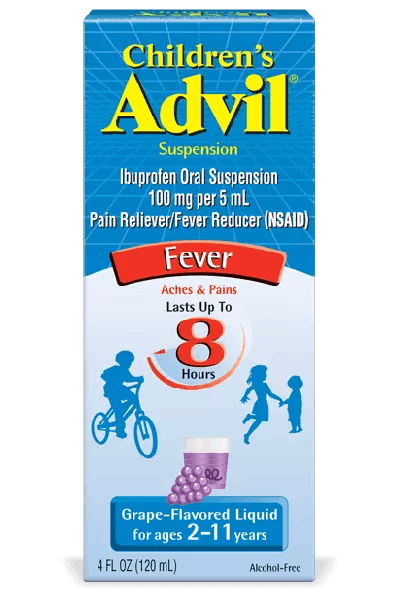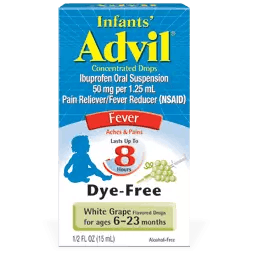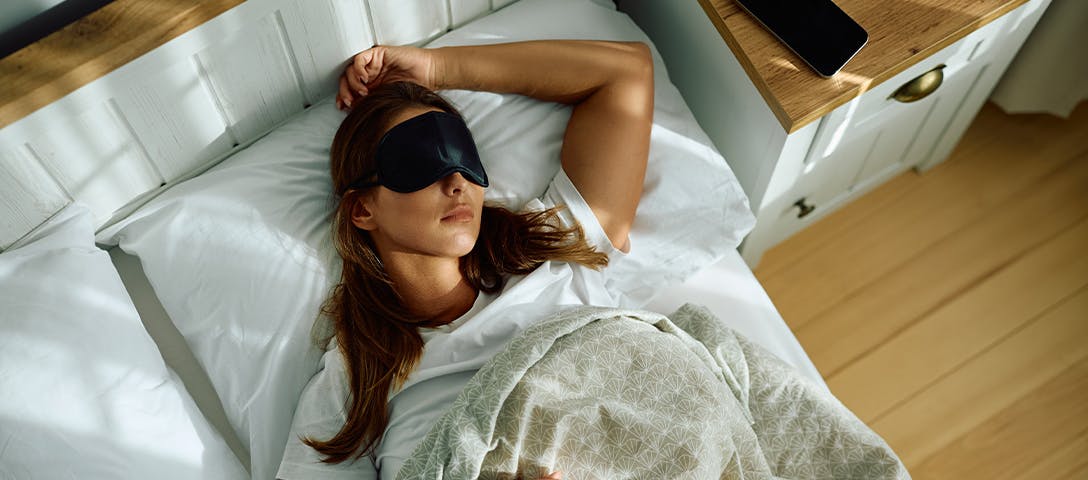Advil PM vs. Natural Sleep Aids
If you’re experiencing aches and pains, a lack of sleep can worsen your symptoms, preventing you from feeling your best when you wake up in the morning. Learn about natural sleeps aids that are available to you without a prescription and discover how they compare to Advil PM—a combination sleep aid and pain reliever.
The importance of healthy sleep
Poor quality sleep includes issues such as sleep apnea, disturbed sleep, and inadequate sleep around or less than 4.5 hours per night.1 This has effects on emotional and physical health.1 Not only can it impact your mood and your ability to concentrate the next day, but prolonged poor sleep can also increase the risk of physical and cardiovascular issues.1
There are many lifestyle changes that can help lead to a better night’s sleep, like sticking to a regular sleep schedule, avoiding caffeine and stress management.2 Speak to your doctor or healthcare professional if you’re experiencing trouble sleeping; they can recommend lifestyle changes or behavior therapy that may help you learn new sleep habits or improve your sleeping environment.2
However, sometimes you might consider additional supplements to achieve a healthy night’s sleep—especially if pain is the reason you’re not sleeping well.
Examples of natural sleep aids
If your healthcare provider recommends a non-prescription sleep aid, it’s important to consider that some sleep aids can make you feel groggy the next day (the so-called hangover effect).2 In addition, some sleep aids may interact with medications or have side effects.2 Here are some of the most common sleep aids available:
Melatonin
Your body naturally produces the hormone melatonin, which helps control your natural sleep-wake cycle.2 This is done through the circadian clock, which responds to the natural light-dark cycle in a day to generate a rhythm.3 The production of melatonin tells your circadian clock that it’s dark and therefore time to go to sleep.3 Melatonin supplements may be helpful in reducing the time it takes to fall asleep, but its side effects can include headaches, nausea and daytime sleepiness.2
Chamomile
This herb has been used for thousands of years for a variety of health benefits like treating an upset stomach.4 It has also been used as an herbal tea, which practitioners of traditional medicine believe can soothe the nerves and induce sleep.4
Valerian root
These supplements are made from the processed roots of the valerian plant, and some research has shown that they may reduce the amount of time it takes to fall asleep.5 Despite this, more research is needed in order to show valerian root is effective,5 and studies showed that valerian did not improve sleep quality compared to a placebo.6
Magnesium
Magnesium is a vital mineral that supports important bodily functions such as regulating blood pressure, muscle and nerve function, and DNA.7 In addition, some studies have found that magnesium may improve sleep quality and might help reduce symptoms of restless leg syndrome, a common sleep disturbance.7 If you’re a healthy individual, you may already get your daily recommended dose of magnesium from a daily diet of plant and animal sources—adding additional magnesium to one’s diet can cause side effects or interfere with medications.7
Sleep aids for elderly individuals
According to some research, nearly 75% of older adults aged 65 years or more experience some form of insomnia, which includes difficulty falling asleep, maintaining sleep, or returning to sleep.9 The body’s internal circadian clocks and sleep-wake cycles can change with age;9 older individuals may experience a shift in the timing of their sleep and wake cycles, causing them to feel sleepy early in the evening.8 Additionally, certain medications can cause side effects that impact the elderly, like ataxia (lack of muscle coordination) or increased fall risk.9
If you experience poor sleep and you’ve already tried to improve your sleeping routine, you might be considering a natural sleep aid. ; Since our bodies produce less melatonin as we age, you may want to try melatonin replacement therapy to improve your sleep.8 However, neither melatonin nor any other natural sleep aid is regulated by the Food and Drug Administration, resulting in less oversight on the purity and exact compositions of melatonin or other natural sleep supplements.8
Ultimately, much remains unknown about the safety and effectiveness of non-medicated sleep aids that are available without a prescription.2 It’s important to talk to your doctor before starting any supplements, which can help you avoid side effects or potential medication interactions.2,8
Advil PM: a combination of sleep aid and pain relief
One of the main physical issues that arises from a lack of sleep is worsening pain, which affects people of all ages and prevents you from feeling your best when you wake up. Conversely, pain can arise that prevents you from having a good night’s sleep.
If you’re experiencing this unpleasant combination of pain and sleeplessness, try Advil PM products such as Advil PM Liqui-Gels Minis, which combines one of the most used pain relievers and the leading sleep aid in one powerful dose to provide 8 hours of sleep. The key difference between Advil PM and natural sleep aids is that Advil PM is an FDA-approved medication powered by the active ingredient ibuprofen. This is a nonsteroidal anti-inflammatory drug (NSAID) that provides powerful relief of headaches, backaches, muscle aches, menstrual or arthritis pain, and discomfort caused by the common cold.
This NSAID is paired with diphenhydramine hydrochloride, a gentle, non-habit-forming sleep aid. This combination of ingredients not only helps reduce your nighttime pain, but it can also shorten the time it takes to fall asleep and increase the duration of your sleep.
SOURCES
- How does inadequate sleep affect health? National Institute of Health. https://www.nichd.nih.gov/health/topics/sleep/conditioninfo/inadequate-sleep/. Accessed 2/20/2025.
- Sleep aids: Understand options sold without a prescription. Mayo Clinic. https://www.mayoclinic.org/healthy-lifestyle/adult-health/in-depth/sleep-aids/art-20047860/. Accessed 2/20/2025.
- New perspectives on the role of melatonin in human sleep, circadian rhythms and their regulation. National Library of Medicine. https://pmc.ncbi.nlm.nih.gov/articles/PMC6057895/. Accessed 2/20/2025.
- Chamomile: A Review of Its Traditional Uses, Chemical Constituents, Pharmacological Activities and Quality Control Studies. National Library of Medicine. https://pmc.ncbi.nlm.nih.gov/articles/PMC9822300/. Accessed 2/20/2025.
- Valerian: A safe and effective herbal sleep aid? Mayo Clinic. https://www.mayoclinic.org/diseases-conditions/insomnia/expert-answers/valerian/faq-20057875/. Accessed 2/21/2025.
- Does Magnesium Help You Sleep Better? Clinical Practice Guideline for the Pharmacologic Treatment of Chronic Insomnia in Adults: An American Academy of Sleep Medicine Clinical Practice Guideline. National Library of Medicine. https://pubmed.ncbi.nlm.nih.gov/27998379/. Accessed 2/21/2025.
- Does Magnesium Help You Sleep Better? Cleveland Clinic. https://health.clevelandclinic.org/does-magnesium-help-you-sleep/. Accessed 2/21/2025.
- Sleep and Its Disorders in Seniors. National Library of Medicine. https://pmc.ncbi.nlm.nih.gov/articles/PMC2516307/. Accessed 2/20/2025.
- Insomnia in Older Adults. National Library of Medicine. https://pubmed.ncbi.nlm.nih.gov/33312842/. Accessed 2/20/2025.
By clicking the link(s) above, you will be taken to an external website that is independently operated and not managed by Haleon. Haleon assumes no responsibility for the content on the website. If you do not wish to leave this website, do not click on the links above.
